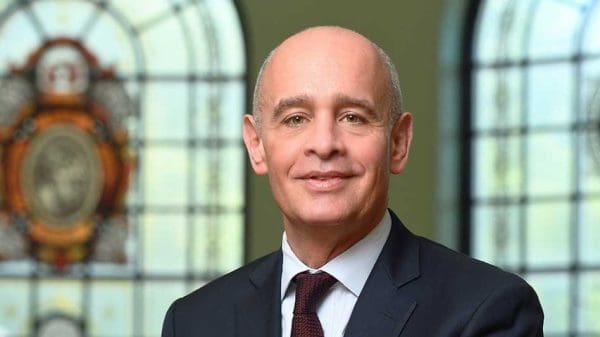
My original plan for this column was to tell you that I have accepted the position of provost at Washington University in St. Louis, and all of the amazing things that I will miss about the Krieger School of Arts and Sciences.
But that was before the whole world changed.
Usually I write this column from my office window overlooking the Decker Quad, where students and faculty rush back and forth to classes, perhaps stopping to shake hands or share a laugh. But the quad is vacant now, and I’m sitting in my home office, essentially quarantined, like the rest of humanity, writing my final column for the Arts & Sciences Magazine. Occasionally our dogs, Lucy and Sookie, will wander in with inquisitive stares. They aren’t used to being home all the time. Every day, my husband, Michael McCaffery—director of the university’s Integrated Imaging Center—and I used to bring our dogs to work with us on the Homewood campus. But work is happening from home now.
The COVID-19 virus has had all of us working, living, and learning in uncommon ways that we never imagined. What started as a usual spring semester, full of promise and anticipation, is ending instead with social distancing, many favorite and important events being rescheduled or canceled, and more than a fair share of anxiety and fear.
And during this time, when each day brings a new challenge, a new change, a new threat, I have been repeatedly buoyed by the courage and dedication of the faculty and students of the Krieger School.
—Dean Beverly Wendland
And during this time, when each day brings a new challenge, a new change, a new threat, I have been repeatedly buoyed by the courage and dedication of the faculty and students of the Krieger School. They have remained steadfast in the midst of a tsunami of change. In what is true Hopkins fashion, they rolled up their respective sleeves and found solutions. They figured out how to teach laboratory classes remotely, how to conduct fieldwork from a laptop, and how to use the library without setting a foot in the building. You can read more about how our students and faculty adapted in a new feature. And none of this would have been possible without our adaptable and dedicated staff.
It has not been easy for anyone in higher education—not for our scholars, striving to provide a quality Hopkins education in innovative ways; not for our seniors, who were looking forward to graduating with their friends; and not for any of us who value the camaraderie of meeting in person with colleagues. For all of our advanced technologies and modes of communicating remotely, nothing replaces the synergy of real, live human interaction.
As I prepare to take on my new position at Wash U (you can read more about that here), under current circumstances I realize that I won’t be able to say goodbye in person to many of the students and colleagues I have interacted with over the years. Of course, I will return to visit, but I still feel like I am missing a sense of closure.
So let me take a moment here to express my gratitude to the members of the Hopkins family; those here now, and those I’ve worked with and taught over the past two decades. I can honestly say that I have learned something from each and every one of you. From the welcome and unexpected phone call from an alum, to an intense conversation with a graduate student about a complex research problem, to creative problem-solving meetings with my stellar leadership team: You have brought challenge, fulfillment, curiosity, gratitude, laughter, and joy to my days and years at Hopkins, and you will forever remain in my heart and mind.
Thank you for all of the collaboration and friendship, and farewell.
Sincerely,
Beverly Wendland
James B. Knapp Dean


